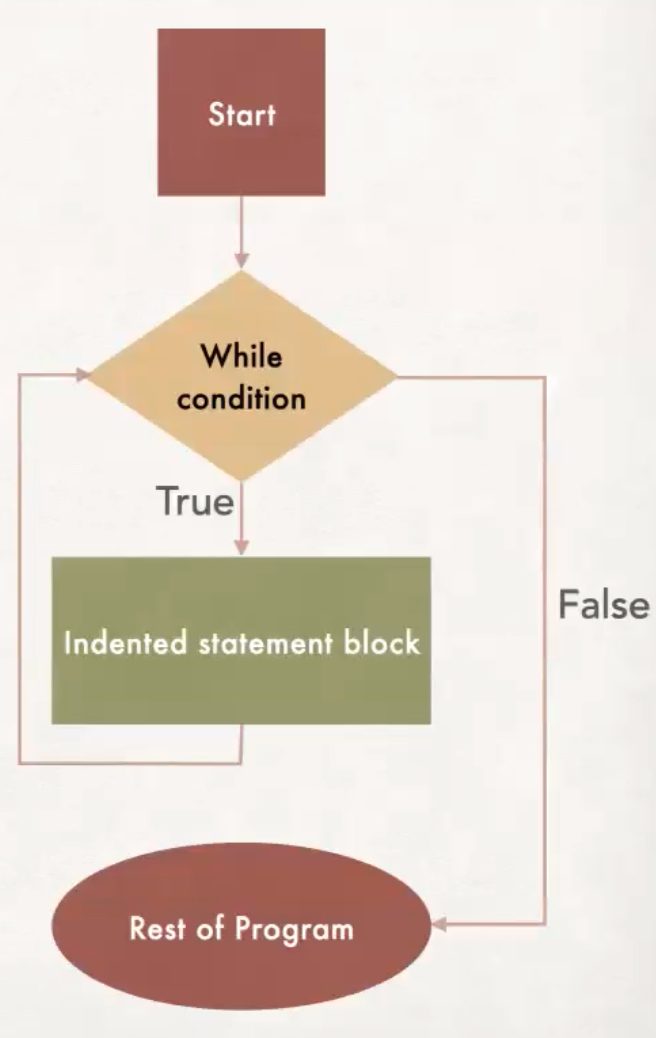Why we need while loops
Note that for-loops of the form
for i in range(N):
# indented block of code
repeat a block of code for a set number of iterations. But there are many cases when the number of repetitions is not known ahead of time. For each of the following examples, you must use a while-loop, not a for-loop, because the number of repetitions is not known when the loop begins.
- Prompt a user to enter a password, asking repeatedly until they get it correct. You don't know in advance how many times it will take.
- Create an animation that continues until the user enters a
qto quit. The animation must continue until they choose to quit, and until then the animation must continue an unknown number of frames. - Write a game for two players who take turns. You don't know in advance how many turns it will take for someone to win.
Syntax of a while statement:
while <condition>:
# indented block of code
# rest of program
The <condition> is a boolean expression. If it evalutes to True, then the indented block of code is executed, and the program returns to the while statement to check the condition again. This repeats until the condition evaluates to False, when the loop stops executing, and the program continues on the next line.
Here is the flowchart that shows visually the path of execution through a while-loop:

Example
The following program repeatedly asks the user "What is the answer to life, the universe and everything?", until the user correctly answers "42".
life_meaning = input("What is the answer to life, the universe and everything? ")
while life_meaning != "42":
life_meaning = input("What is the answer to life, the universe and everything? ")
print("Correct!")
Here is a sample run of the program:
What is the answer to life, the universe and everything? string cheese
What is the answer to life, the universe and everything? zoroastrian dualism
What is the answer to life, the universe and everything? photobombing giraffe
What is the answer to life, the universe and everything? 42
Correct!
Should I use a for-loop or a while-loop?
Though it is not always a good idea, it is actually possible to use a while-loop instead of a for-loop. The two code blocks shown below behave the same, each of them outputting the integers from 0 to 9:
|
|
|
|
|
Although the above code snippets show that it is possible to replace a for-loop with a while-loop, this is not advised. Instead, use the following guidelines to determine which type of loop to use:
- Use a
while-loop when the number of iterations is unknown before the loop completes. - Use a
for-loop when before you know how many iterations you need befor the loop starts executing. - It's still better to use a
for-loop if the number of iterations is unknown while you are writing the program, but is determined during the program before the loop is executed (in other words,for i in range(variable)), since in this case the value is known by the time the loop begins.
Putting it all together
Example 1
Here's an example of a full program that uses a while-loop. It simulates rolling a six-sided die, to see how many rolls it takes to roll a 6. Note that a for-loop is not possible here, since we do not know how many rolls of the die it will take until we finally roll a 6.
| Code | Sample output |
|
|
Example 2:
In the following example, we improve a program from a previous section. This time, we will check that each of the user's inputs is valid. If not, we use a while-loop to continue asking them the question until they enter something sensible.
"""
A simple program that determines user eligibiity to vote
Author: COMP 1351 Instructor
Filename: voting.py
Date:
Course: COMP 1351
Assignment: Preview of nested conditional statements
Collaborators: 1351 Instructors
Internet Sources: None
"""
# Check citizenship requirement
is_citizen = input("Are you a US citizen? (Enter Y or N) ")
# Continue to ask for input until they enter either Y or N
while is_citizen != 'Y' and is_citizen != 'N':
is_citizen = input("Invalid input. Are you a US citizen? (Enter Y or N) ")
if is_citizen == 'Y':
# Check age requirement
age = int(input("How old are you? "))
# Continue to ask for input until they enter a non-negative age.
while age < 0:
age = int(input("Invalid age. How old are you? "))
if age >= 18:
# Check registration requirement
is_registered = input("Are you registered to vote? (Enter Y or N) ")
# Continue to ask for input until they enter either Y or N
while is_registered != 'Y' and is_registered != 'N':
is_registered = input("Invalid input. Are you registered to vote? (Enter Y or N) ")
if is_registered == 'Y':
print("You can go ahead and vote.")
else:
# Cannot vote because unregistered
print("You must be registered to vote.")
else:
# Cannot vote due to age
print("You must be 18 years or older to vote.")
else:
# cannot vote due to citizenship
print("You must be a US citizen to vote.")